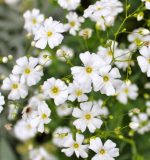 A native of the Caucasus, this short lived annual is a member of the carnation family, Caryophyllaceae, that also includes pinks and campions. Plants grow 12-18″ tall, tend to branch in the upper parts only, and have narrow gray-green leaves. The single star-shaped flowers are carried in loose panicles on long slender stems in summer and have five notched white or pink petals surrounded by a calyx with white tipped green sepals. Double flowered cultivars are available and are preferred for drying. Plants do not tolerate hot humid conditions and fade when temperatures are consistently above 85 F. The genus name, Gypsophilia, comes from the Greek words gypsos meaning chalk and philia meaning friendship, and refers for the plants fondness for soils with high pH. The specific epithet, elegans, is the Latin word for choice or elegant.Type: Annual
A native of the Caucasus, this short lived annual is a member of the carnation family, Caryophyllaceae, that also includes pinks and campions. Plants grow 12-18″ tall, tend to branch in the upper parts only, and have narrow gray-green leaves. The single star-shaped flowers are carried in loose panicles on long slender stems in summer and have five notched white or pink petals surrounded by a calyx with white tipped green sepals. Double flowered cultivars are available and are preferred for drying. Plants do not tolerate hot humid conditions and fade when temperatures are consistently above 85 F. The genus name, Gypsophilia, comes from the Greek words gypsos meaning chalk and philia meaning friendship, and refers for the plants fondness for soils with high pH. The specific epithet, elegans, is the Latin word for choice or elegant.Type: Annual
Bloom: Single star-shaped white or pink flowers in loose panicles on long slender stems in summer
Size: 12-18″H 12″ W
Light:Full sun to partial shade
Soil: Average, medium moist, well-drained, alkaline
Hardiness: Survives light frost but intolerant of temperatures consistently over 85.
Care: Make several sowings during the summer to ensure a continuous supply of flowers.
Pests and Diseases: Root rot may develop in rainy conditions.
Propagation: Seed
Companion Plants: Bachelor button, poppy, lupine
Outstanding Selections:
‘Carminea’ (carmine-rose flowers, 1.5-2.5′ tall)
‘Covent Garden’ (large flowers; 2-2.5′ tall)
‘Red Cloud’ (rose to carmine flowers)
‘Rosea’ (pale pink flowers)